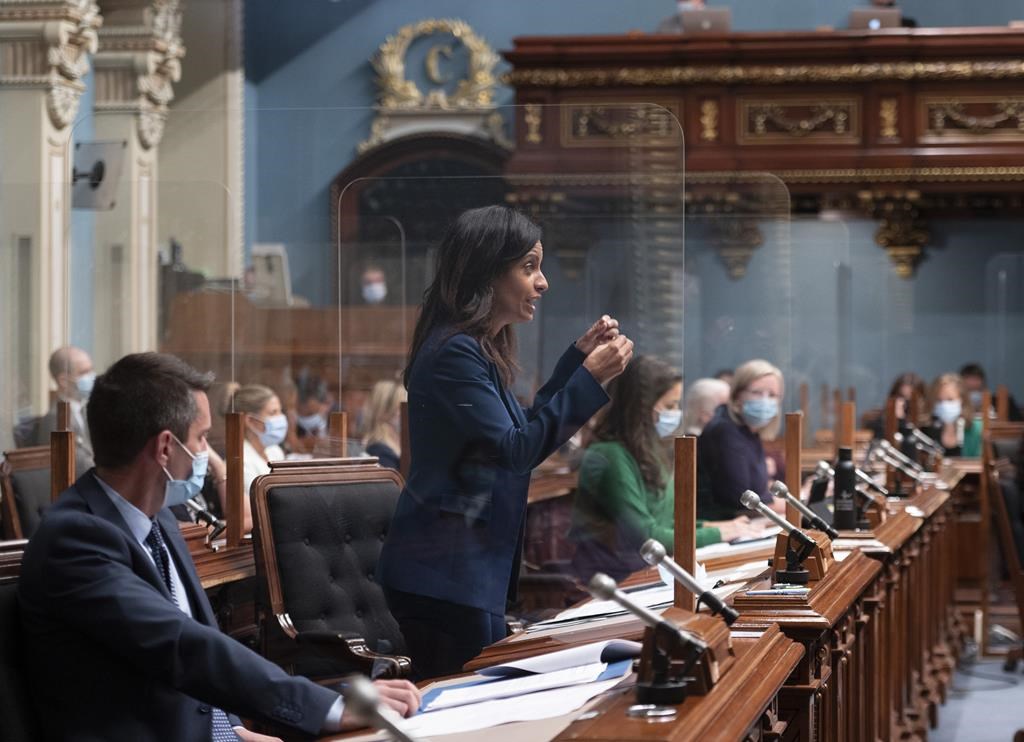The life of a politician isn’t easy — even less so if you’re the leader of a party and a woman, says Quebec Liberal Party leader Dominique Anglade.

In politics, women are judged more harshly in many respects, she says. They feel the pressure to be perfect at all times and must constantly prove themselves, with little room for anger or mistakes.
And if you must face Premier François Legault every day in parliament, it doesn’t get any better, according to Anglade.

She says her gender has played a role in the premier’s attitude towards her.
“He’s a paternalistic person, that’s for sure,” Anglade said during an interview with The Canadian Press.
READ MORE: Anglade seeks closure for families of CHSLD victims
Sitting in a Quebec City cafe, it was the end of a difficult week for her party: in Marie-Victorin’s Monday by-election, the Liberals came in fifth place with only seven per cent of the popular vote.
Anglade criticized comments made on the evening of Legault’s victory in the district, when he claimed Quebecers didn’t appreciate her “mudslinging” over the CHSLD Herron, where dozens of seniors died during the first wave of the pandemic.
Were the premier’s comment inaccurate, condescending and even sexist?

“Absolutely,” said Anglade.
Anglade says she’s singled out as “aggressive or whiny” whenever she criticizes the government “in a firm manner” — a reality she believes doesn’t exist for male politicians.

Get breaking National news
“The bias is there.”
But Anglade tries her best to keep herself in check at the National Assembly, convinced that she would not be forgiven for the slightest misstep, be it a clumsy word or burst of anger.
Anglade also claimed Legault treats the men and women in his circle differently.
READ MORE: Legault under fire as opposition seizes on explosive report into COVID in care homes
“It’s clear that he wipes the slate more easily for men,” she said, referring to the three women who have been removed from the cabinet since the mandate’s beginning: Marie-Chantal Chasse, Sylvie D’Amours and Marie-Eve Proulx.
No male ministers have suffered the same fate, although some have had difficulties.
Anglade cited the case of Economy Minister Pierre Fitzgibbon, who was repeatedly rebuffed by the Ethics Commissioner, but is still in office.
“I could never have done what Pierre Fitzgibbon did and remained a minister,” said Anglade, adding that she has “much less room to make mistakes” than her male counterparts.
To reverse this trend, she argues more space is needed for female political leadership, a reality she hopes will be reflected in all spheres of society.
‘Perfect woman’ syndrome
Knowing they have little room to manoeuvre, female politicians strive to be nothing less than perfect, Anglade said.
She says she suffers, like so many other women who have tried to make their mark in politics, from “the syndrome of the one who must not make any mistakes.”
But this reflex “limits you in all that you can be, in all that you can say, in the way you express yourself,” she said, adding that it “prevents you from being what you naturally are.”

There’s “a dichotomy between the person I am and the perception people have”, she said — a “gap between the public image and the real person.”
With the election approaching, the woman who has been leading the party for nearly two years intends to be much more present in the field, to make voters discover the “real” Dominique Anglade.
She’s relying on her winning back the francophone vote in certain regions by advocating for increased decentralization of powers. The first announcement on this subject will be made Thursday in Trois-Rivières.
Anglade says she wants to return to the party’s core values, including economic development. Her vision includes integrating wealth creation and the fight against climate change into a more coherent strategy.
The Liberal is well aware that she only has a few months to get back on track, and “the challenge is huge but exciting.”













Comments